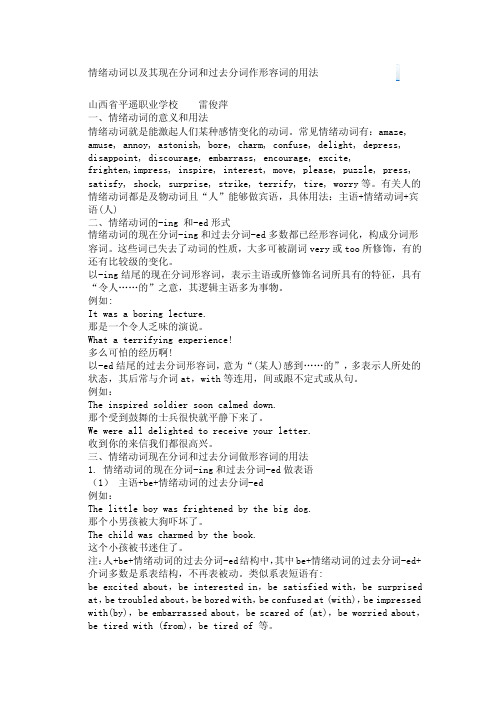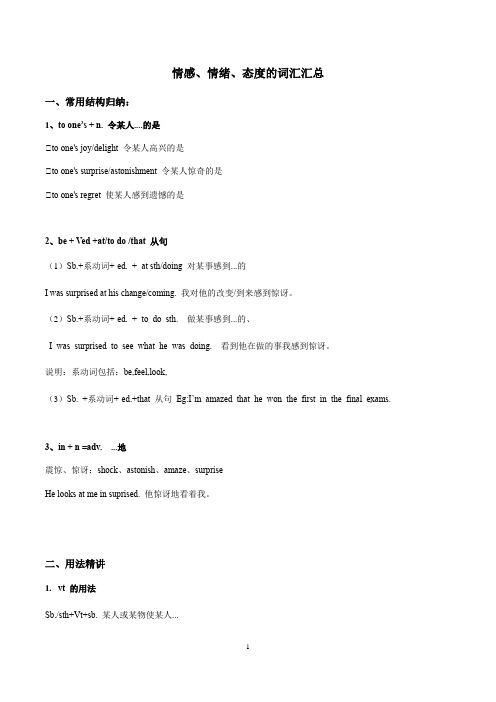情绪动词、关系代名词、形容词句子
学习描述情感和感受的动词

学习描述情感和感受的动词情感和感受是人类内心世界的重要组成部分,通过适当使用描述情感和感受的动词,我们可以更准确地表达自己的内心体验,增强沟通的效果。
本文将介绍一些常用的描述情感和感受的动词,帮助读者扩展自己的词汇,并以此提升表达能力和语言表达的准确性。
1. 愉快愉快是一种积极正向的情感,常常与快乐、高兴等词语相联系。
以下是一些用于描述愉快情感的动词:- 喜悦:形容内心非常高兴、充满喜悦;- 欣喜:形容对某事感到非常满意和高兴;- 欢快:形容非常愉快和欢乐;- 感激:形容对他人的帮助或关心深表谢意;- 陶醉:形容完全沉浸在某种愉快的感觉中。
2. 悲伤悲伤是一种消极的情感,通常与失望、痛苦等词语相关联。
以下是一些描述悲伤情感的动词:- 哀伤:形容心中感到非常悲伤和难过;- 忧伤:形容内心的困扰和痛苦;- 悲痛:形容心中充满悲伤和痛苦;- 倾诉:形容倾听他人的忧伤和痛苦,并给予安慰和支持;- 哭泣:形容因悲伤而流泪。
3. 兴奋兴奋是一种强烈且充满活力的情感,通常与激动、热情等词汇相关。
以下是一些描述兴奋情感的动词:- 热衷:形容对某事非常热情和投入;- 激动:形容内心感到非常兴奋和激动;- 期待:形容对未来的某件事情非常兴奋和期待;- 窥探:形容对某种新奇事物的探索充满好奇和兴奋;- 狂喜:形容情绪的高涨和充满喜悦。
4. 害怕害怕是一种消极情感,通常与恐惧、紧张等词汇有关。
以下是一些描述害怕情感的动词:- 恐惧:形容内心感到非常害怕和恐惧;- 焦虑:形容内心感到非常担忧和不安;- 惊恐:形容突然被吓到而感到非常害怕;- 紧张:形容内心感到紧绷和不安;- 战栗:形容因极度害怕而发抖。
5. 高兴高兴是一种积极的情感,常常与幸福、满足等词汇相联系。
以下是一些描述高兴情感的动词:- 快乐:形容内心感到非常愉悦和幸福;- 满足:形容对当前状况感到非常满意和幸福;- 愉悦:形容内心感到非常愉快和满意;- 喜悦:形容内心非常高兴和快乐;- 兴高采烈:形容内心感到非常兴奋和高兴。
高中英语中常见的40个情绪情感类词汇用法+课件-2025届高三英语上学期一轮复习专项

对某事感到恼火
to one’s annoyance
令某人恼怒/厌烦的是
Exercise
1. It annoys me to listen (listen) to his instructions. 2. She was annoyed with the designer for his forgetting to phone her. 3. To his annoyance (annoy), the car broke down on the way to the airport.
4. astonish
v. 使吃惊;使惊讶
astonished adj. 感到十分惊讶的→astonishing adj. 令人感 到惊讶的→astonishingly adv.→astonishment n. 惊讶
be astonished at/by sth. be astonished to do sth. in astonishment to one’s astonishment
Exercise
1. We were able to convince the students of the need for wider reading. 2. I managed to convince my friend to join (join) the running club with me. 3. The lawyer presented a convincing (convince) argument to the jury, resulting in a favorable verdict. 4. She is convinced (convince)that she can pass the exam.
情绪动词、关系代名词、形容词句子29页PPT

1
0
、
倚
南
窗
以
寄
傲
,
审
容
膝
之
易
安Байду номын сангаас
。
谢谢你的阅读
❖ 知识就是财富 ❖ 丰富你的人生
71、既然我已经踏上这条道路,那么,任何东西都不应妨碍我沿着这条路走下去。——康德 72、家庭成为快乐的种子在外也不致成为障碍物但在旅行之际却是夜间的伴侣。——西塞罗 73、坚持意志伟大的事业需要始终不渝的精神。——伏尔泰 74、路漫漫其修道远,吾将上下而求索。——屈原 75、内外相应,言行相称。——韩非
情绪动词、关系代名词、形容词句子
6
、
露
凝
无
游
氛
,
天
高
风
景
澈
。
7、翩翩新 来燕,双双入我庐 ,先巢故尚在,相 将还旧居。
8
、
吁
嗟
身
后
名
,
于
我
若
浮
烟
。
9、 陶渊 明( 约 365年 —427年 ),字 元亮, (又 一说名 潜,字 渊明 )号五 柳先生 ,私 谥“靖 节”, 东晋 末期南 朝宋初 期诗 人、文 学家、 辞赋 家、散
文 家 。汉 族 ,东 晋 浔阳 柴桑 人 (今 江西 九江 ) 。曾 做过 几 年小 官, 后辞 官 回家 ,从 此 隐居 ,田 园生 活 是陶 渊明 诗 的主 要题 材, 相 关作 品有 《饮 酒 》 、 《 归 园 田 居 》 、 《 桃花 源 记 》 、 《 五 柳先 生 传 》 、 《 归 去来 兮 辞 》 等 。
情绪动词以及其现在分词和过去分词作形容词的用法

情绪动词以及其现在分词和过去分词作形容词的用法山西省平遥职业学校雷俊萍一、情绪动词的意义和用法情绪动词就是能激起人们某种感情变化的动词。
常见情绪动词有:amaze, amuse, annoy, astonish, bore, charm, confuse, delight, depress, disappoint, discourage, embarrass, encourage, excite,frighten,impress, inspire, interest, move, please, puzzle, press, satisfy, shock, surprise, strike, terrify, tire, worry等。
有关人的情绪动词都是及物动词且“人”能够做宾语,具体用法:主语+情绪动词+宾语(人)二、情绪动词的-ing 和-ed形式情绪动词的现在分词-ing和过去分词-ed多数都已经形容词化,构成分词形容词。
这些词已失去了动词的性质,大多可被副词very或too所修饰,有的还有比较级的变化。
以-ing结尾的现在分词形容词,表示主语或所修饰名词所具有的特征,具有“令人……的”之意,其逻辑主语多为事物。
例如:It was a boring lecture.那是一个令人乏味的演说。
What a terrifying experience!多么可怕的经历啊!以-ed结尾的过去分词形容词,意为“(某人)感到……的”,多表示人所处的状态,其后常与介词at,with等连用,间或跟不定式或从句。
例如:The inspired soldier soon calmed down.那个受到鼓舞的士兵很快就平静下来了。
We were all delighted to receive your letter.收到你的来信我们都很高兴。
三、情绪动词现在分词和过去分词做形容词的用法1. 情绪动词的现在分词-ing和过去分词-ed做表语(1)主语+be+情绪动词的过去分词-ed例如:The little boy was frightened by the big dog.那个小男孩被大狗吓坏了。
高考词汇复习(人教版)---高中阶段所有情绪情感动词及相应考法-word文档资料

高考词汇复习(人教版)---高中阶段所有情绪情感动词及相应考法-v+ed.(自己)感到···的情绪情感v.-v+ing.令(别人)···的1.tire—tired—tiring—tiredness2.shock—shocked—shocking3.frighten—frightened—frightening4.amaze—amazed—amazing—amazement5.excite—excited—exciting—excitement6.exhaust—exhausted—exhausting—exhaustion7.terrify—terrified—terrifying8.satisfy—satisfied—satisfying—satisfaction9.interest—interested—interesting—interest10.amuse—amused—amusing—amusement11.depress—depressed—depressing—depression12.astonish—astonished—astonishing—astonishment13.bore—bored—boring14.embarrass—embarrassed—embarrassing—embarrassment15.relax—relaxed—relaxing—relaxation16.disappoint—disappointed—disappointing—disappointment17.annoy—annoyed—annoying—annoyance18.confuse—confused—confusing—confusion19.threaten—threatened—threatening20.surprise—surprised—surprising21.puzzle—puzzled---puzzling22.worry—worried--worrying高考考法练习1.The _________ (confuse) look on her face suggested that she hadn't quiteunderstood her manager's idea.2.They asked me so many ___ (confuse) questions that I got _______(confuse) at last.3.The children were ___ (tire)after the trip.4.The ___ (tire)trip lasted a whole day.5.The trip made the children ___ (tire).6.The bad weather made the trip ___ (tire).7.Tom’s parents are ___ (tire)at his ___ (tire)results of theexams.8.___ (disappoint)and angry, he left the meeting-room.9.It is ___ (disappoint)that he didn’t pass the examination.10.When hearing the ___ (surprise)news that Michael Jackson passedaway, they were to look at each other.11.He was ___ (worry)about his ___ (worry)son.答案:1.confused2.confusing, confused3.tired4.tiring5.tired6.tiring7.tired, tiring8.disappointed9.disappointing10.surprising11.worried, worrying12.。
写作专题提升之情感、情绪、态度的词汇汇总

情感、情绪、态度的词汇汇总一、常用结构归纳:1、to one’s + n. 令某人....的是①to one's joy/delight 令某人高兴的是②to one's surprise/astonishment 令某人惊奇的是③to one's regret 使某人感到遗憾的是2、be + Ved +at/to do /that 从句(1)Sb.+系动词+-ed. + at sth/doing 对某事感到...的I was surprised at his change/coming. 我对他的改变/到来感到惊讶。
(2)Sb.+系动词+-ed. + to do sth. 做某事感到...的、I was surprised to see what he was doing. 看到他在做的事我感到惊讶。
说明:系动词包括:be,feel,look,(3)Sb. +系动词+-ed.+that 从句Eg:I’m amazed that he won the first in the final exams.3、in + n =adv. ...地震惊、惊讶:shock、astonish、amaze、surpriseHe looks at me in suprised. 他惊讶地看着我。
二、用法精讲1.vt 的用法Sb./sth+Vt+sb. 某人或某物使某人...eg: Mary moved us.玛丽使我们感动。
His words embarrassed me.他的话让我很尴尬。
2.vt.→adj.-ed 感到....的,修饰人,句子的主语通常是人(人的表情也用-ed)。
-ing 令人感到....的,修饰物,句子的主语通常是物。
amaze使惊讶→amazing令人惊讶的→amazed惊讶的;感到惊讶的annoy 使生气→annoying令人生气的→annoyed=angry生气的bore 使无聊→boring令人感到无聊的→bored感到无聊的confuse 使糊涂使困惑→confusing令人困惑的;费解的混乱的→confused感到困惑的/糊涂的convince 使确信;使信服→convincing令人信服的;有说服力的→convinced感到信服的disappoint 使失望→disappointing令人失望的→disappointed感到失望的discourage 使泄气;使沮丧→discouraging令人泄气的;灰心的;→discouraged感到泄气的disgust 使厌恶;使憎恶→disgusting令人厌恶的;令人作呕的→disgusted感到厌恶的/憎恶的embarrass 使尴尬→embarrassing令人尴尬的→embarrassed感到尴尬的excite 使兴奋→exciting令人感到兴奋的→excited 兴奋的;感到兴奋的exhaust 使精疲力竭→exhausting令人筋疲力尽的→exhausted感到筋疲力尽的fascinate 使着迷→fascinating令人着迷的→fascinated着迷的frighten 使惊恐使害怕→frightening令人惊恐的;令人害怕的→frightened感到受惊的/害怕的frustrate使灰心;使沮丧;使愤怒→frustrating挫败的,泄气的→frustrated感到挫败的,泄气的interest 使产生兴趣interesting →令人感兴趣的→interested对...感兴趣的move 使感动→moving令人感动的→moved感动的puzzle 使迷惑;使困惑→puzzling使为难的,费解的→puzzled感到迷惑的/困惑的relax 使放松→relaxing令人放松的→relaxed 放松的;感到放松的shock 使震惊→shocking令人震惊的→shocked感到震惊的surprise 使惊讶→surprising令人惊讶的→surprised惊讶的;感到惊讶的thrill 使狂喜;使激动;使极度兴奋→thrilling扣人心弦的;激动人心的→thrilled感到欣喜若狂/非常开心的tire 使疲劳→tiring令人疲劳的→tired感到疲劳的touch 使触动→touching令人触动的→touched触动的worry 使担忧→worrying令人担忧的→worried感到担忧的特殊变化:please→pleasing=pleasant→pleasedscare→scary→scaredsatisfy→satisfying=satisfactory→satisfieddelight使高兴;使愉快;使快乐delightful 令人高兴的delighted 高兴的愉快的(4)Sth makes/keeps sb +-ed. He often makes us interested in his classes.(5)和介词的搭配be surprised/amazed at 对...感到吃惊be embarrassed about/at 对...感到尴尬be excited/thrilled about/at 对....感到激动兴奋be shocked at 对..感到震惊be interested in 对...感兴趣be pleased/happy/satisfied with对....感到高兴满意be tired with/from由于....感到疲倦be exhausted from/with 因...筋疲力尽be fascinated with 对....着迷/动心be delighted with sb./sth 对...感到高兴be disgusted with 对...感到厌恶be annoyed=angry with 对...感到愤怒生气be scared/terrified/afraid/frightened of 对.....感到害怕/恐惧be tired of 对....感到厌倦be tired out/be exhausted 筋疲力尽be bored with 对....感到厌烦be moved/touched by 被...感动be moved/touched to tears 感动得流下了眼泪be deeply moved深深地感动了be relaxed about 对 ....感到放松be shocked by 被...震惊be shocked to do sth.震惊地做某事be worried about =worry about 担心... ,对...感到焦虑/担心be fascinated in/by 被...迷住be delighted for sb.为.。
情绪动词

Practice
二 依提示作答: 1. Is the answer satisfying to you? (用Are~改寫) ________________________________________ 2. English doesn’t bore me. (用i~改寫) ________________________________________ 3. Her words confused me. (用i~改寫) ________________________________________ 4. My grades satisfy my mother (用My mother~改寫) ________________________________________ 5. Isn’t the news surprising to you? (用Are~改寫) ________________________________________
1. 2. 3. 4. 5. He is excited about the movie. History was interesting to Tom. Your grades are surprising to your parents. I am satisfied with his answer. Are you tired with the work?
範例
• 這本漫畫使我興奮: The comic book excites me. = The comic book is exciting to me. = I am excited about the comic book. • 這故事使我們厭煩: The story bores us. = The story is boring to us. = We are bored with the story. • 這消息使我驚訝: The news is surprising to me. = I was surprised at the news. = The news surprised me. • 你的話使他們困惑: Your words confuse them. = Your words are confusing to them. = They are confused by / with / about your words. • 這份工作使我煩惱: The work troubles me. = The work is troubling to me.=I am troubled with the work.
高中英语中最常用的30个情感类动词及其形容词变形!

【导语】我们在平时的英语学习中常常会遇到“使某⼈感到怎样”的动词,为⽅便⼤家学习和复习,今天,要和⼤家分享⾼中阶段常⽤的30个情感类动词以及它们的形容词变形,注意:以ing结尾的形容词表⽰物的特征,译为“令⼈......的”;以ed结尾的动词表⽰⼈的感受,译为“感到......的”。
以下内容由⽆忧考整理发布,欢迎阅读参考!1. amaze: v. 使某⼈吃惊;amazing:adj. 令⼈惊叹的;amazed:adj. 感到惊奇的2. annoy: v. 使某⼈恼怒;annoying:adj. 令⼈恼怒的;annoyed:感到恼怒的,⽣⽓的3. astonish:v. 使某⼈惊愕;astonishing:adj. 令⼈惊愕的;astonished:adj. 感到惊愕的4. confuse:v. 使某⼈困惑;confusing:adj. 令⼈困惑的;confused:adj. 感到困惑的5. convince:v. 使某⼈信服;convincing:adj. 令⼈信服的;convinced:adj. 感到信服的6. delight:v. 使某⼈⾼兴;delighting(delightful):adj. 令⼈⾼兴的;delighted:感到⾼兴的7. depress:v. 使⼈低落;depressing:adj. 令⼈低落(沮丧)的;depressed:感到沮丧的8. disappoint: v. 使某⼈失望;disappointing: adj. 令⼈失望的;disappointed:adj. 感到失望的9. discourage:v. 使某⼈泄⽓;discouraging:adj. 令⼈泄⽓的;discouraged:adj. 感到泄⽓的10. disgust:v. 使⼈厌恶;disgusting:adj. 令⼈厌恶的;disgusted:adj. 感到厌恶(恶⼼)的11. embarrass:v. 使⼈尴尬;embarrassing:adj. 令⼈尴尬的;embarrassed:adj. 感到尴尬的12. encourage:v. 使有勇⽓; encouraging:adj. 令⼈⿎舞的; encouraged:adj. 感到⿎舞的13. excite:v. 使⼈兴奋;exciting:adj. 令⼈兴奋的;excited:adj. 感到兴奋的14. exhaust: v. 使⼈筋疲⼒尽; exhausting:adj. 令⼈筋疲⼒尽的; exhausted:adj. 感到筋疲⼒尽的15. fright:v. 使⼈惊恐;frightening:adj. 令⼈惊恐的; frightened:adj. 感到恐惧(害怕)的16. frustrate:v. 使⼈沮丧; frustrating:adj. 令⼈沮丧的; frustrated:adj. 感到沮丧的17. inspire:v. 使⼈⿎舞;inspiring:adj. 令⼈⿎舞的; inspired:adj. 感到⿎舞的18. interest:v. 使⼈有兴趣; interesting:adj. 令⼈感兴趣的; interested:adj. 感到有兴趣的19. irritate:v. 使⼈愤怒;irritating:adj. 令⼈愤怒的;irritated:adj. 感到愤怒的20. move:v. 使⼈感动;moving:adj. 令⼈感动的;moved:adj. 感动的21. please:v. 使⼈愉快;pleasing(pleasant):adj. 令⼈愉快的; pleased:adj. 感到快乐的22. puzzle:v. 使⼈困惑;puzzling:adj. 让⼈困惑的; puzzled:adj. 感到困惑的23. satisfy:v. 使⼈满意;satisfying(satisfactory):adj. 令⼈满意的;satisfied:adj. 感到满意的24. shock:v. 使⼈震惊; shocking:adj. 令⼈震惊的; shocked:adj. 感到震惊的24. sicken:v. 使⼈恶⼼; sickening:adj. 令⼈恶⼼的; sickened:adj. 感到恶⼼的26. surprise:v. 使⼈惊讶; surprising:adj. 令⼈惊讶的; surprised:adj. 感到惊讶的27. terrify:v. 使⼈害怕; terrifying:adj. 令⼈害怕的; terrified:adj. 感到害怕的28. tire:v. 使⼈疲倦; tiring:adj. 令⼈疲倦的; tired:adj. 感到疲倦的29. touch:v. 使⼈触动; touching:adj. 令⼈触动的; touched:adj. 感到触动的30. worry:v. 使⼈担忧; worrying:adj. 令⼈担忧的; worried:adj. 感到担忧的。
- 1、下载文档前请自行甄别文档内容的完整性,平台不提供额外的编辑、内容补充、找答案等附加服务。
- 2、"仅部分预览"的文档,不可在线预览部分如存在完整性等问题,可反馈申请退款(可完整预览的文档不适用该条件!)。
- 3、如文档侵犯您的权益,请联系客服反馈,我们会尽快为您处理(人工客服工作时间:9:00-18:30)。
形容词 形容词子句
形容詞子句
意義:以關係代名詞 關係代名詞所引導的關係子句, 關係代名詞 修飾先行詞。 先行詞就是關係代名詞所替代的名詞。 先行詞 關係代名詞如:who/ which/ that 關係代名詞
當需要將兩個句子合而為一時, 當需要將兩個句子合而為一時,常 會使用形容詞子句。 會使用形容詞子句。
以物為先行詞為例
This is the beautiful house which I used to live in. This is the beautiful house that I used to live in. This is the beautiful house I used to live in. This is the beautiful house in which I used to live . This is the beautiful house where I used to live.
When
When=in which 常用於the time(時間)之後。 舉例: I love the time when we went out together. I like May in which I will have a birthday gift. I like May when I will have a birthday gift.
舉例一: 舉例一: The boy has blue eyes + The boy is playing baseball with Ben = the boy (who is playing baseball with Ben ) has blue eyes. 其中紅字由who 帶領的子句即為關係子句, 其中紅字由who is 帶領的子句即為關係子句, ()中的句子若是丟掉 原句依舊成立。 中的句子若是丟掉, ()中的句子若是丟掉,原句依舊成立。
情绪动词表
interest 感到有趣 surprise 感到惊讶 感到惊讶 excite 感到兴奋 感到兴奋 bore 感到无聊 感到无聊 satisfy 感到满意 感到满意 scare 感到害怕 tire 感到疲累 worry 感到担心 感到担心
不同情绪形容词的介系词也不相同
bored excited worried scared surprised tired satisfied impressed Interested with/about about about of at/by of with with/by about/at 句型:主语+be动词 +连缀动词 当主语是人,情绪动 词多以 V+ed 呈现。 指:某人对某事感 到…
以人为 以人为先行词举例
I like the girl who has long hair. 喜欢长头发的女孩 的女孩。 我喜欢长头发的女孩。 girl, I like the girl, who has long hair. 喜欢长头发的女孩 的女孩。 我喜欢长头发的女孩。 I like the girl whom Josh fell in love with. with. I like the girl with whom Josh fell in love. 喜欢Josh 曾经喜欢过的那位女孩 Josh曾 的那位女孩。 我喜欢Josh曾曾经喜欢过的那位女孩。 (that that) The girl (that) I like is my classmate. 那位我喜欢的女孩是我的同学 喜欢的女孩是我的同 那位我喜欢的女孩是我的同学。
embarrassed about/at
I am excited about our performance. He is scared of ghost. Mom is satisfied with our grades. I am surprised by the way you look today.
舉例三: 舉例三: The tall man is my Math teacher. + The man’s hair is grey. = the tall man (whose hair is grey) is my Math teacher. whose用於所有格,紅字為關係子句,省略 用於所有格, 用於所有格 紅字為關係子句, 後原句仍成立。 後原句仍成立。
I like the teacher, who is kind and smart. A I like the teacher who is kind and smart. B A我只喜欢一个老师。 B只要是和善跟聪明的老师我都喜欢。
注意! 注意!
that 用于人、事、物各种情況,为受 用于人、 物各种情況, 词时可以省略 可以省略。 词时可以省略。 whom 已经日渐少用。 经日渐少用 少用。 where=in which。 where= which。
When will you leave? Will you tell me when you will leave? Will you tell me when何者為非? 最後一句錯了! 最後一句錯了!
Why
Why= for+which 常用於the reason(原因)之後。 舉例: She doesn’t know the reason why they broke up in one week.
Joe is impressed with you. He is never worried about you. I am tired of my job. She was embarrassed about the fact that she failed the PE class.
情绪动词的两种用法 情绪动词的两种用法
举例二:interest 举例二 I am interested in this subject. interested This subject is interesting. interesting ing.
关系代名词
关系代名词
功用:具有连接词跟代名词两种功用。 功用: 有连接词跟代名词两种功用。 跟代名词两种功用 主格→ 所有格→ 受格→ 主格→作主 所有格→修 受格→作受 语 饰名词 受 人 事物、 事物、动 物 人+事物/ 事物/ 动物 沒有先行 詞 Who/that Which/that That that whose Whose Of which X X Whom/that Which/that That what
举例一 举例一:bore bored 我是一个无聊 ed. 个无聊的人 I am bored. 我是一个无聊的人 ing. 觉得现在很 在很无 boring I am boring. 我觉得现在很无聊 boring 这本书令我感到 ing. 我感到无 This book is boring. 这本书令我感到无聊 The boring boy makes us bored. 这位令人厌烦的人使我 感到厌烦 的人使我们 这位令人厌烦的人使我们感到厌烦
Where are you going? I don’t know where you are. I will follow you wherever you go. No matter where you go, I will follow you.
想一想這些where的不同意義及用法? 想一想這些where的不同意義及用法? 想一想這些where的不同意義及用法
*情绪动词 *关系代名词 形容词句子 *形容词句子
情绪动词
情绪动词
意义:用以表现情绪的动词, 意义:用以表现情绪的动词,如『感到…』 表现情绪 感到… 的句子。 的句子。 特色:都可以变成情绪形容词,如tired, 特色:都可以变 情绪形容 tired ed, boring boring 等。 句型: 句型: 主语+be动词 动词+ ing+ 主主语+be动词+V-ing+to 某物使某人感到... ...) (某物使某人感到...) 如: That movie is interesting to us. 那部电影节 电影节我 感到有趣) (那部电影节我们感到有趣)
關係副詞
關係副詞
意義:介系詞+關係代名詞。同時也有連 接詞或是副詞的功能。 常見關係副詞: Where When Why How
Where
Where= in+which =at+which =on+which 通常用於the place the place(地點)之後。 舉例: I hate the place in which we stayed. I hate the place where we stay.
How
How= in+which 常用於the way(方法)之後。 舉例: That is the way which I study in. That is the way in which I study . That is the way how I study.
舉例二: 舉例二: I want the dress (which you wore at the party last Friday.) ) dress在此句為受詞,which 即可省略。 在此句為受詞, 即可省略。 在此句為受詞 ()內即為關係子句。 ()內即為關係子句 內即為關係子句。
